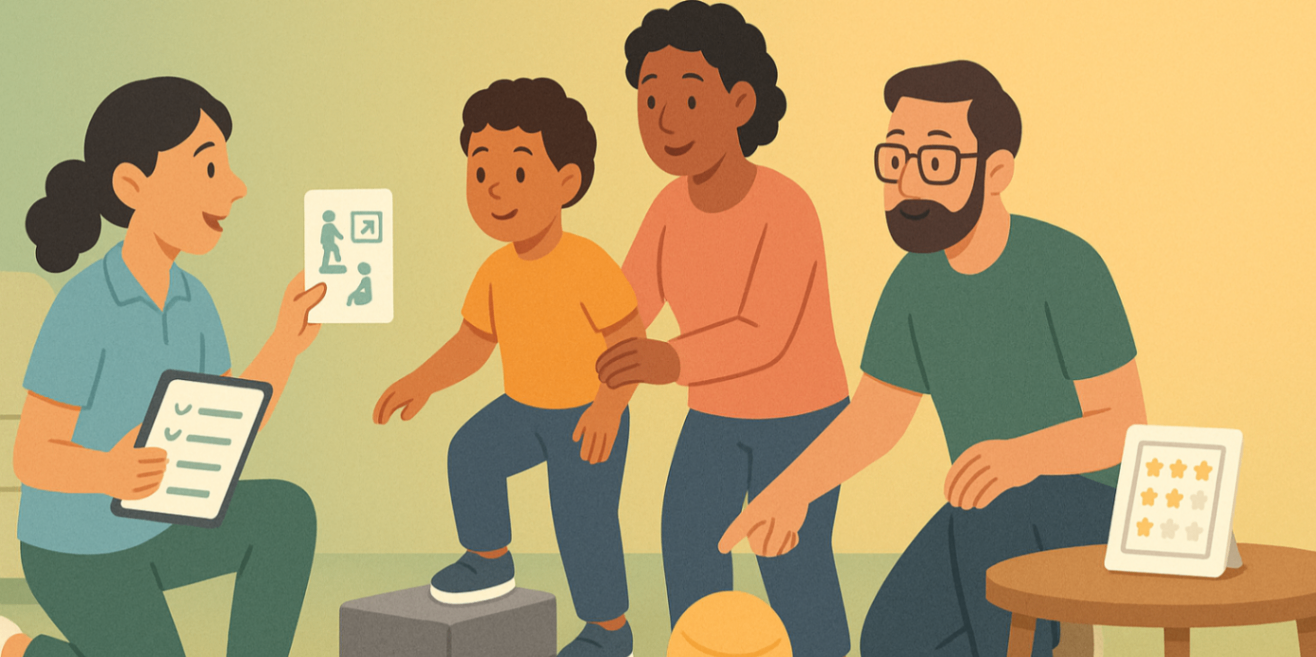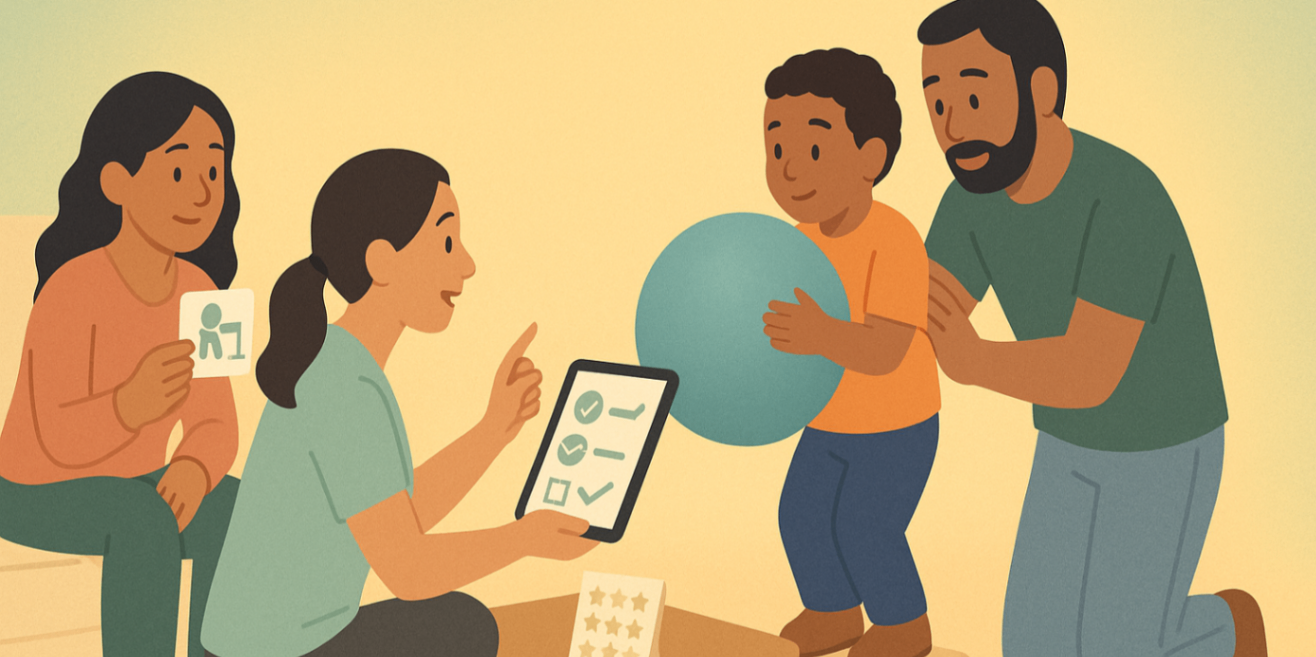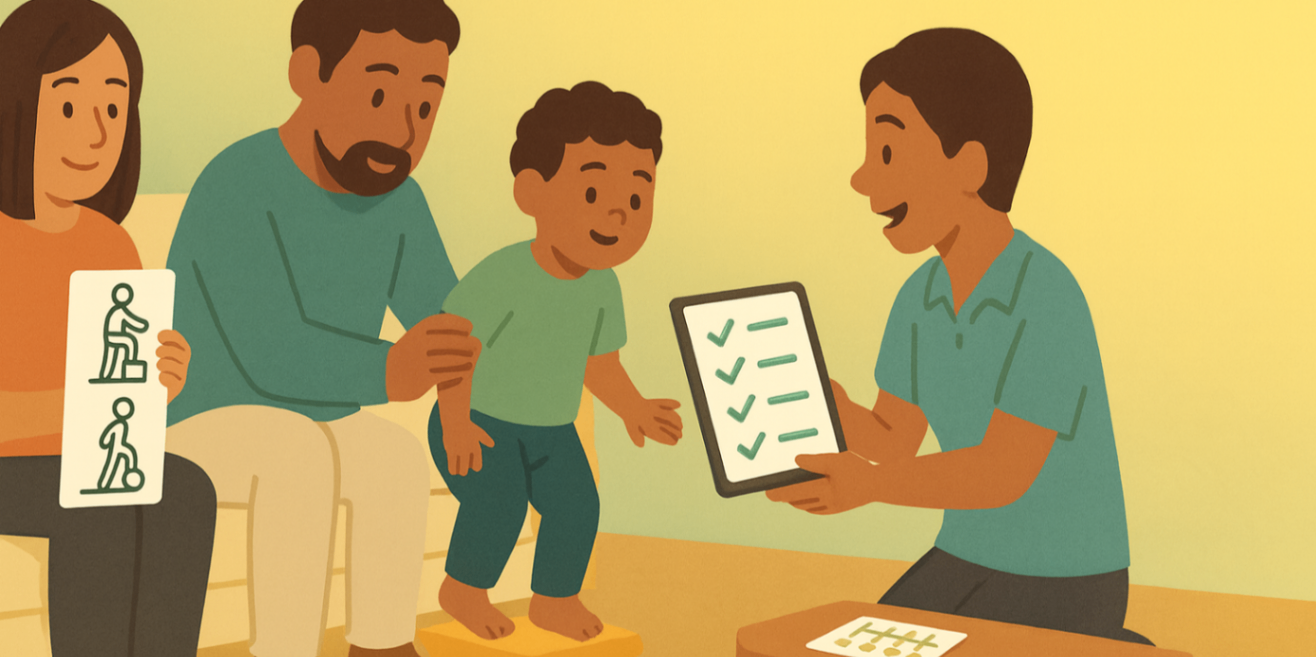
paediatric exercise physiology for global developmental delays (gdd)
29 August, 2025
Physical activity is very important for your child’s body, mind, and social life. But some children, like those who have developmental delay or global developmental delay, may find it hard to join in regular movement and play. This is where a paediatric exercise physiologist can help. The exercise physiologist uses planned exercise interventions to give your child the chance to grow stronger, build confidence, and learn important life skills. These activities also help with overall child development and well-being.
Key Highlights
-
A paediatric exercise physiologist designs a tailored exercise program to support children with developmental disabilities.
-
Specialised physical activity helps children with global developmental delay (GDD) improve their motor skills and coordination.
-
Exercise interventions are evidence-based and customised to meet your child’s unique needs and goals.
-
These programs can improve physical capacity, social skills, confidence, and overall quality of life.
-
The primary goal is to foster a healthy lifestyle through enjoyable and achievable exercise.
Understanding Paediatric Exercise Physiology
Paediatric exercise physiology is a health area that uses movement to make children feel good and stay healthy. An accredited exercise physiologist looks at the science behind exercise and plans safe and helpful physical activity for your child. These plans are made to fit your child’s needs, what they can do, and what they want to achieve.
This way is not the same as regular fitness workouts. The exercise physiologist knows how a child’s body grows and changes with exercise. The main goal is to help kids enjoy moving, make it easy for them to join in, and help them use good habits their whole life. Next, we will talk more about exercise physiology and how it helps children.
Defining Paediatric Exercise Physiology in Australia
In Australia, paediatric exercise physiology is a part of allied health. It helps young children by using exercise and showing them how to make healthy changes in life. A paediatric exercise physiologist is an accredited exercise physiologist who works with kids. Many have a master’s degree in the area. Their know-how in exercise physiology helps take care of and keep away chronic health conditions through movement.
These specialists work with kids from when they are babies to their teenage years. They know a lot about child development. This includes the way kids grow and think. With this knowledge, a paediatric exercise physiologist can make safe and fun physical activity plans for young people. They want kids to get the most out of these plans.
Their job goes past just training the body. Every accredited exercise physiologist teaches and backs up families too. They help parents and carers learn how to use physical activity in everyday life. This helps kids live an active life and they have better health for it. The support from families can make a big difference in the child’s health and happiness.
Key Principles and Approaches for Children
The heart of paediatric exercise physiology is its personal and goal-driven way of working. Health professionals in this field make exercise interventions for each child. They want to help the child reach important developmental milestones. First, they look at the child’s current physical skills and any limits. Then they make a safe and useful exercise prescription for that child.
These exercise programs use evidence-based ideas. This way, people know that these activities can help a child’s development in the right way. The work is to make good progress, but the activities are fun and help keep kids excited. This helps them see physical activity as a good and lasting part of life.
Key approaches used by these specialists include:
-
Goal-Oriented Planning: The team sets clear goals you can reach. This might be to help with balance, gain strength, or do more in school sports.
-
Play-Based Therapy: The experts use games and fun ideas to help kids get better at physical skills. It should not feel like hard work.
-
Family-Centered Care: Parents and caregivers have a role, too. They help the children at home and in the community.
Global Developmental Delays (GDD) in Children
Global developmental delay (GDD) means that a child takes more time than other children to reach basic developmental milestones. These could be things like talking, moving, or learning how to get along with others. This kind of developmental delay is one of the many developmental disabilities. It affects different parts of a child's development. It may change how they move, talk, learn, and spend time with people.
Some children with global developmental delay may also have other conditions such as cerebral palsy or autism spectrum disorder. But sometimes it may happen on its own. To know the signs and what a diagnosis means is the first step to getting help for your child. The next sections below talk more about the different aspects of a child's developmental delay and help you understand GDD better.
Overview of Global Developmental Delay
Global developmental delay happens when a child is behind in two or more skills. This means there are problems with motor skills, speech and language, cognitive skills, or social and emotional growth. Most of the time, you will see this before a child turns five.
There can be many causes for global developmental delay. It might be because of genetic conditions, some chronic medical conditions, or health problems that impact the brain and nerves. The best thing you can do is to find out early so the child can get the help they need for better child development.
Global developmental delay does not look the same in every child. The delay can be mild or very strong. One child may struggle with speech, while another may have more issues with movement or social skills. A full checkup helps professionals know which areas need help. This guides them to provide support for child development in the ways that work best.
Common Early Signs and Diagnoses
Knowing the early signs of global developmental delay can help you get support faster. Parents usually be the first to see when their child does not meet important developmental milestones on time. This can include sitting up, crawling, walking, or talking. When you see these delays, it may be time to talk to health professionals.
Getting help early matters, because it can make a big difference for the child's future. A diagnosis of global developmental delay often happens after health professionals do a full check. This will help to rule out other issues, and makes a clear way for therapy or support. This can also help with their mental health.
Some early signs of developmental delay that you might see are:
-
Trouble with gross motor skills, such as rolling over, sitting, or walking.
-
Issues with fine motor skills like picking up things or using utensils.
-
Late speech and language skills, or trouble understanding what people say.
The Role of Paediatric Exercise Physiologists for GDD

For children who have global developmental delay, a paediatric exercise physiologist is important in helping them grow stronger and feel better. These experts make special exercise plans that deal with things like low muscle tone, poor coordination, and problems with planning movement. For each child, the exercise physiologist comes up with fun and interesting activities. These activities help the child reach specific goals with movement and doing daily tasks.
Their support helps improve physical health. It also helps children feel more sure of themselves and take part in more activities every day. Now, let's look at how an exercise physiologist checks a child and works with other professionals to help them with developmental delay and global developmental delay.
Assessments and Evaluations for Children with GDD
The first step in creating a tailored program is a comprehensive assessment. An exercise physiologist will start by discussing your child's medical history, developmental journey, and your family's specific goals. This initial consultation is essential for understanding your child's unique strengths and challenges.
Following the initial discussion, the exercise physiologist will conduct a series of assessments to evaluate your child's physical skills. These tests are designed to be engaging and are adapted to the child's age and ability. The information gathered helps the professional design a program that is both safe and effective.
The results of these evaluations form the baseline for the tailored program. Progress is monitored regularly to ensure the exercise plan remains effective and continues to meet your child's evolving needs.
|
Assessment Component |
What It Measures |
|---|---|
|
Gross Motor Skills |
Evaluates balance, coordination, running, jumping, and throwing to identify areas for improvement. |
|
Physical Capacity |
Assesses endurance, core strength, and posture to help reduce fatigue during daily activities. |
|
Functional Movement |
Observes everyday movements like walking, climbing stairs, and standing up from a chair. |
|
Strength & Flexibility |
Measures muscle strength and range of motion to address issues like low muscle tone or joint hypermobility. |
Collaborative Care with Physiotherapists and Allied Professionals
Effective support for a child with GDD often needs a team of health professionals to work together. An exercise physiologist is part of this group and may join with other experts to give care that looks at many health issues. This way, all parts of your child's progress can be thought about.
An exercise physiologist works to help your child get better fitness, endurance, and to join in through exercise programs. Someone in paediatric physiotherapy can diagnose and treat body problems by using hands-on ways. People who do occupational therapy help kids with daily living activities like using their fine motor skills.
This team method helps your child get full care. The main people involved can be:
-
Paediatric Physiotherapists: They help with recovery and use hands-on treatments.
-
Occupational Therapists: They help kids practice fine motor skills and tasks at home or school.
-
Speech Therapists and Psychologists: They support speaking, understanding, and feeling good about themselves.
Programs and Interventions Provided
Many children with developmental delay or other challenges need special help to grow and learn. There are programs and interventions made just for them. Accredited exercise physiologists design these plans to build both gross and fine motor skills. The programs have structured activities that help kids use their bodies and hands better.
Exercise interventions can also help children get stronger over time. The goal is to boost their physical capacity, improve their health, and help them join in with others in their community. These personalised plans are important for kids with things like autism spectrum disorder, cerebral palsy, and global developmental delay. Taking part in these activities can help young people hit more developmental milestones and have a healthier lifestyle.
Types of Movement and Activity Plans
Many different plans for movement and activities are made to fit the needs of each age group. These programs help people build motor skills. For babies, tummy time and sensory play help with building basic strength and fine motor skills. Young children learn fundamental movement skills through fun and coordinated games. Teens usually need more structured exercise interventions. These help teens build physical capacity and work on their health. When people use these programs, they can work on their physical skills and they also get to spend time with others. This helps all of us get into a healthier lifestyle that can help with everyday activities and overall growth.
Customising Sessions by Age Group: Babies, Young Children, and Teens
Making movement and activity plans for different age groups is important for good child development. For babies, the focus is on activities that help grow gross motor skills. These gentle movements help build muscle strength and let the baby learn how to control and move their body. As young children grow, they benefit from exercise interventions that include easy and fun movement tasks. These actions help to boost basic motor skills, social skills, and health.
When kids become teens, their sessions can have specific goals. These can focus on building physical capacity, support in being part of their community, and help improve their mental health and quality of life. By doing this, children get what they need for each stage of their growth.
Benefits of Exercise Physiology for Children with GDD

The benefits of exercise physiology for children with GDD are more than just getting fit. When kids join in regular, guided physical activity, they get better at moving and feel better in their day-to-day life. The programs use exercise physiology to help with child development in every way.
Exercise helps kids build strength and learn how to move well. It also helps them grow stronger social skills. With more support, children can do better in daily living activities at home, at school, and in the community. The next sections will talk about these benefits in detail.
Improving Motor Skills, Strength, and Coordination
One of the main aims of paediatric exercise physiology for children with GDD is to help them get better at motor skills. Many kids with developmental delays find it hard to do basic movements, like running or jumping, as well as tasks that need finer control. Exercises that focus on these skills help build the basic abilities needed.
Many children with GDD have low muscle tone. This can make it tough for them to keep good posture, balance, and build muscle strength. An exercise physiologist plans activities that target weak muscles. By working on these, kids can get stronger and more stable. This increase in physical capacity lets them move better and feel more sure about what they can do.
Key areas of improvement include:
-
Building Core Strength: Important for balance, good posture, and working the arms and legs together.
-
Enhancing Gross Motor Skills: Helping with climbing, throwing, and kicking a ball.
-
Addressing Low Muscle Tone: Making muscles stronger so they support the joints and boost endurance.
Supporting Social, Cognitive, and Emotional Development
Physical activity is not just good for the body. It also helps a child's social, thinking, and emotional skills. When kids take part in group exercise, they learn the basics of good social skills. They learn things like taking turns, talking with other kids, and working in teams. This is key for them to make friends and build up their confidence.
Regular physical activity gives a big boost to mental health and helps with thinking skills, too. It lets kids focus better. It helps them pay attention and solve problems. Moving the body is a good way for many kids to deal with their feelings and lower their stress or worries. This means it helps their emotional well-being. The American Psychological Association says that group exercise also brings people together and helps fight loneliness.
When they get better at both moving and talking to others, children are more likely to want to be part of their local community. If a child feels good about themselves and has support, they will likely want to join playground games, sports at school, or other group events.
-
Improved Social Skills: Kids learn to share, work together, and talk with others when they are part of a group.
-
Enhanced Emotional Regulation: Physical activity can help kids deal with things they feel and need.
-
Boosted Confidence: Being active helps kids know their bodies better and gives them more self-worth, so they join in more activities.
Conclusion
Paediatric exercise physiology plays a vital role in supporting children with developmental delays. By carrying out detailed assessments and creating tailored exercise plans, exercise physiologists help children build motor skills, strength, and coordination, while also supporting social, cognitive, and emotional development. This holistic approach gives children the chance to thrive in every aspect of life, while also empowering parents with the knowledge and strategies to support their child’s growth.
Book your consultation with daar Liverpool today and find out how our paediatric exercise physiology services can help your child gain confidence, strength, and lifelong skills.
Frequently Asked Questions
How can parents access NDIS-funded paediatric exercise physiology in Australia?
In Australia, parents often use NDIS money from their child’s Capacity Building plan. You may find this under "Improved Health and Wellbeing" or "Improved Daily Living." The best way for you to check if this is right for you is to talk to NDIS-registered health professionals who give exercise physiology services. They can help you know what to do next.
What should parents expect from an initial session with a paediatric exercise physiologist?
At the first visit, a paediatric exercise physiologist will talk with you about your child’s health history. They will also ask about your child’s goals. Next, the exercise physiologist will check your child’s physical abilities. All this helps them create a tailored program for your child. The program is made to be safe and work well for your child.
Are paediatric exercise physiology services available in major Australian cities like Sydney and Perth?
Yes, you can find paediatric exercise physiology services in big Australian cities such as Sydney and Perth. There are many clinics that offer these exercise physiology services. Families in the city and countryside can use Telehealth to get help, which helps more people to join in their community.
.svg)

















